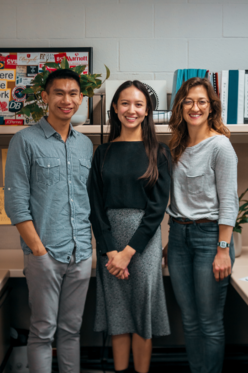Every ten years, the U.S. government conducts a nationwide count of the entire population called the census, and this year—despite the emergence of COVID-19 and the widespread disruption it has caused—is no different. The IRC in LA has been hard at work ensuring that even during these unique challenges, everyone counts for the upcoming 2020 Census.
Why does the census matter?
The census is massively important for a number of reasons. For one, census results are used to determine how much federal money is allocated to each community for necessities such as hospitals, schools, transportation, housing, and other resources. Secondly, it is used to determine the number of representatives each locality receives in Congress. If a population is undercounted, it means that critical resources—such as those needed during a pandemic—may not be adequate, available, or accessible. It also means that the community will not receive their proportionate voice in politics for the next ten years to come.
Due to the fear that has been drummed up around the census, especially pertaining to the question of citizenship (which will not be asked on the 2020 census), the IRC has undertaken critical efforts to combat what could possibly be the largest undercount in U.S. census history.

Why is it so important to make sure refugees and immigrants count?
The census affects political representation and community resources and services, many of which the immigrant and refugee community rely on for support. If refugees and new Americans aren't counted, they could lose out on services that deeply affect them. The affects aren't short term either—if a child isn't counted, it could affect nearly their entire childhood.
For new Americans, this may be the first time they are able to practice their civic duty. It is so important for them to understand that they have a direct impact on their community and government by participating in the census. However, relaying that message can be difficult. Many refugees have left their home countries due to political or religious persecution, often at the hands of their own government. There may be a higher level of distrust among immigrant and refugee communities, so it's important that extra work is done to make sure they know the U.S. census is safe and secure.
On top of that, additional confusion and fear was drummed up when the Trump administration attempted to add the citizenship question to the census. Experts argued that in addition to being unconstitutional, the question would lead to a severe undercount, of not only undocumented immigrants, but also refugees, asylees, and other legal permanent residents as well. Although the question was removed, and it is not being asked on the census, some of that fear still remains.
What is the IRC doing to ensure everyone is counted in the upcoming census?
The IRC is a trusted messenger in the community of Los Angeles, and so it serves a unique role in reaching out to refugees and immigrants to not only build their confidence in the census, but also help them to understand its importance.
The IRC in LA's Census Outreach Coordinator, Rachel Tang, has been leading efforts to make sure every refugee and immigrant that has come through IRC's doors is counted. When they walk in the lobby, they are greeted with an informational census video, brochures and materials translated into several different languages, and even census 'swag' such as t-shirts, buttons, and bags that have been surprisingly hot commodities. In addition to that, IRC staff have been integrating census education into citizenship classes, naturalization workshops, and orientations for newly arrived refugees and asylees.
Another main tool being used to reach refugees is phone banking. Prior to the pandemic, IRC was grateful to receive a group of bright young students from Oglethorpe University who dedicated their time and resources to support the LA office on their 'alternative spring break'. In just two days, they helped reach over 2,000 refugees with critical census information.

How has COVID-19 impacted census outreach efforts?
The IRC in LA relied on many community events and communications to get the word out, and even had a 'census kiosk' set up for those visiting the office to complete the census in person. Fortunately, IRC's census outreach efforts have transitioned smoothly to remote phone banking, mainly being conducted by well-trained volunteers and interns.
“More than ever, we rely on our trained volunteers to conduct outreach to our clients, calling and informing clients about why they should respond to the census by phone, mail or online.” says Rachel Tang, the IRC’s census outreach coordinator.
Fortunately, the census deadline date has been extended to August 14th, and it has never been easier to complete the census at home—whether that’s online, by phone, or through the mail. In fact, this is the first time that the census is available online: https://my2020census.gov/.
“In light of the new challenges with COVID-19, the social service programs that relieve crises and the decisions our representatives make have a direct impact on the community we serve,” says Tang, “In times of uncertainty, our community relies on us to be advocates for them as well as teaching them to be advocates for themselves. Encouraging our clients’ participation in the 2020 census is an essential tool for making their voices heard.”
How can you help?
- First, make sure your household has filled out the census. You can do so here.
- Act as a trusted messenger in your community—share this article and get the facts out about the census and its importance.
- Volunteer—email carly.boos@rescue.org to find out more about how you can help reach refugees and immigrants from the safety of your home.